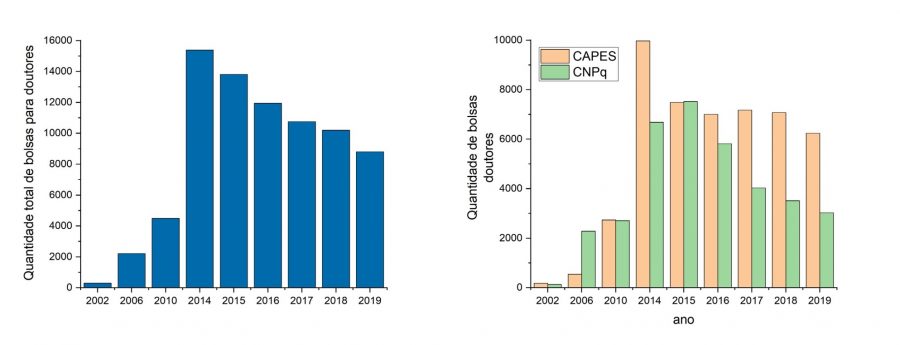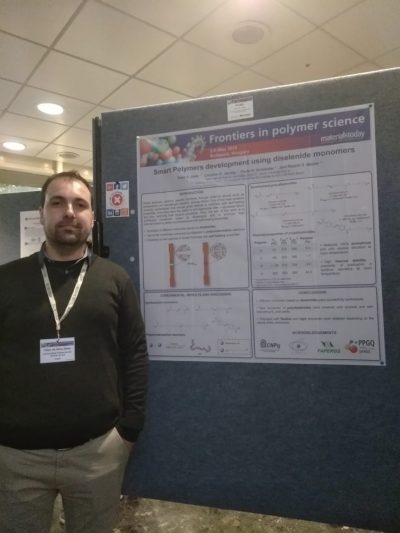Post-doc researcher: essential professional for an efficient research group
In the Covid-19 pandemic the world is now experiencing, the importance of science and technology has become more evident to many people, with examples ranging from diagnostic tests and vaccines to the electronic devices that allow us to do almost everything remotely.
However, few know in detail how scientific and technological knowledge is produced in universities, which are the main scientific knowledge “factories” in Brazil. For each advance reported in a scientific article or patent, or transformed into a product or process, there are months or years of reading, laboratory experiments, computer simulations, discussions, analysis, writing.
Furthermore, there is the administrative work necessary in all research, which includes, among other tasks, project preparations to compete for financing, the recruitment of human resources and the purchase of inputs and equipment – often involving bureaucratic imports.
Far from the image of a scientist working alone in the laboratory, the reality is that to accomplish all of this, each scientific project must have a team of collaborators. Ideally, these teams are made up of people with different degrees of qualification and experience: undergraduate and graduate students (human resources in training process), postdoctoral fellows (junior science professionals) and professors, devoted to teaching, research and mentoring students (group leaders).
In addition to working on their research projects, “post-docs” assist in the intermediation between the group leader and the students, and gain experience in research management, as they more actively participate in administrative activities. Unlike the professor, the post-doc has no obligation to teach, nor does he need to hold an administrative position at the university. “The postdoctoral student can dedicate his/her efforts entirely to research projects, ensuring efficiency,” says Osvaldo Novais de Oliveira Junior, professor at the São Carlos Institute of Physics at USP.
Everyone benefits in this structure. Scholarship students receive more attention in their training, the post-doc gains experience as scientist in the profession and the group becomes more productive. “In a group, the post-doc leverages research and allows for more complex work,” says Professor Mônica Cotta, leader of the Laboratory of Nano and Biosystems at UNICAMP.
Postdoctoral fellowships are shrinking
An apparently large number of trained PhDs are currently in an unsuccessful search for opportunities to exercise scientific activity in Brazil. This situation is related to the decrease in the number of scholarships offered by federal agencies that deal with research grants: CNPq and Capes. In fact, after reaching maximum values between 2014 and 2015, the number of postdoctoral fellowships has decreased significantly, as shown in these graphs.

Without remuneration, these highly trained and specialized professionals, whose training takes, on average, a decade, look for positions abroad, adding to the “brain drain” that occurs in times of little appreciation of science in the country. Or worse, they abandon science to ensure their financial survival.
Unlike other groups that are suffering from a decrease or lack of income during the pandemic, the group of unpaid PhDs is not visible in society, nor has it been addressed by any government aid program.
Faced with this scenario, B-MRS is gathering stories of PhDs who have not found opportunities to remain active in research, in order to sensitize society and the government to the difficulties these people and their families are going through and understand the negative impacts of this situation for the country. B-MRS also request the restoration of the number of postdoctoral scholarships, in addition to a policy aimed at valuing and encouraging the placement of PhDs in development and innovation activities in our society.
Tales: PhD in Chemistry, freelancer and volunteer researcher

To be a professor in some Brazilian university, performing research, teaching and mentoring. That is what Tales da Silva Daitx chose to do as a profession. He has liked science since he was a child, but it was at the university that he found the passion to discover new things and to transmit knowledge to others through research and teaching. Tales then went through the required path to properly train and be able to compete in a public or private teaching and research institution.
After graduating in Chemistry from the Federal University of Rio Grande do Sul (UFRGS), he entered the Chemistry graduate program at this university – a program of excellence and with the highest score in the evaluation of Capes (entity in charge of expansion and consolidation of graduate studies in Brazil). He spent six years there working on his master’s and doctorate, both focused on research in the field of intelligent materials.
In mid-March of this year, a few days after the World Health Organization (WHO) declared the Covid-19 pandemic, Tales defended his thesis, the final stage of every doctorate, at the Chemistry Institute of UFRGS. It was one of the last in-person defenses at the institute, together with his wife, who completed her doctorate at the same time. Since then, the couple, who live in Porto Alegre, are trying to earn an income to pay their bills and, at the same time, remain active and productive in research, two objectives that have not been possible to conciliate.
After his doctorate, Tales intended to move on to the next stage of his scientific career, a postdoctoral fellowship (popularly called “post-doc”). Thus, he contacted a research group from the Federal University of Santa Catarina (UFSC), where he could apply the knowledge acquired in graduate school in a project to develop smart nanoparticles for biodegradable packaging.
Thus, after defending his doctorate, already in the middle of a pandemic, Tales participated in two calls for proposals from CNPq, the main federal research funding agency, to try to obtain a post-doc grant, of around 4 thousand reais. Trained to carry out the project and with a competitive curriculum, with eleven scientific articles published in international journals and two patents (one filed and one already granted), Tales obtained a score close to the maximum in the first call. However, he was informed he would not be awarded a grant due to the resources available. The second notice, that would have the result in August, was suspended due to the pandemic.
Currently, while looking for other opportunities, Tales works as a voluntary postdoc (without a grant or any other type of remuneration) in the research group where he completed his doctorate. He participates in meetings, does bibliographic searches, and writes projects. However, he is unable to dedicate his efforts to these activities full time, since, to meet the couple’s basic financial needs, Tales became a freelancer. This 30-year-old professional, highly trained and specialized in an area of knowledge, is currently spending much of his time performing services, such as data entry in computer systems, which do not require such qualification.
“I think this situation in Brazil is a shame, the lack of opportunities for PhDs. In the past there was investment in science and technology, and it had good results. The country was well positioned in research around the world. But the investment did not continue, and that will bring it back to square one,” says Tales. “In addition, the pandemic has affected the research system. Public S&T policies should be revised,” he adds.

Petra Rudolf
While I totally agree with the author that the decrease in postdoctoral fellowships is a big loss for Brazil and very worrying, I also want to break a lance for going abroad for a postdoc. A postdoc abroad does not necessarily qualify as brain drain if the person comes back for an academic career afterwards. In my own university, the University of Groningen in the Netherlands, it is even mandatory to have been abroad for at least 2 years, to be able to apply for a tenure track assistant professor position. Learning other ways and mentalities in doing research is a good training and people you meet while playing tennis or going for a beer during your postdoc can become your collaborators for the next 20 years – at least this is what happened in my case, but I know many colleagues for whom it is true to. If you go to a university which is highly attractive internationally you might also be exposed to many interesting talks that you would not have heard otherwise and in Europe there are currently many more open postdoc positions than good candidates (see the website for science jobs in the European Union for example: https://euraxess.ec.europa.eu).
Ivan H Bechtold
Ótima reportagem, isso precisa ser discutido e divulgado. É lamentável que profissionais altamente qualificados, como é o caso do Tales e tantos outros jovens doutores no Brasil, não sejam valorizados. A continuidade do trabalho destes pesquisadores recém formados com remuneração pública precisa ser visto como investimento no desenvolvimento científico e tecnológico do País.